Buzz has some great rich-media sharing capabilities. But Facebook still owns your social-sharing network.
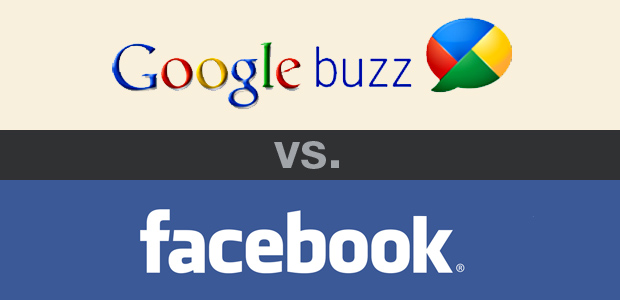
Yesterday, Google unveiled Buzz, a new service for sharing short updates that's been immediately billed as direct competition for both Twitter and--more interestingly--Facebook. Today, Buzz has just begun trickling out into the real world. So how does the service stack up with Facebook? Here's a quick review.
If you're not familiar with Buzz, it's basically like a Twitter/Facebook feed on some very powerful steroids. You access it simply via a tab in Gmail. A "buzz" works about like a tweet or a facebook wall post, allowing you to post links and images in a short note shared with your Gmail contacts. And that's when things get interesting:
1. Media Integration: Buzz Wins
So far, Buzz has been integrated with Flickr, Twitter, and Picassa. You pull that off simply by logging onto those services through Buzz. Anything you post to those accounts--and mark "public"--gets shared:
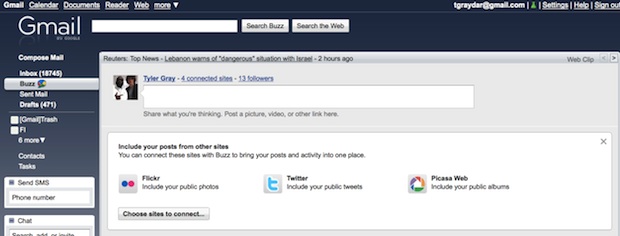
Of course, Facebook allows you to do the same thing:
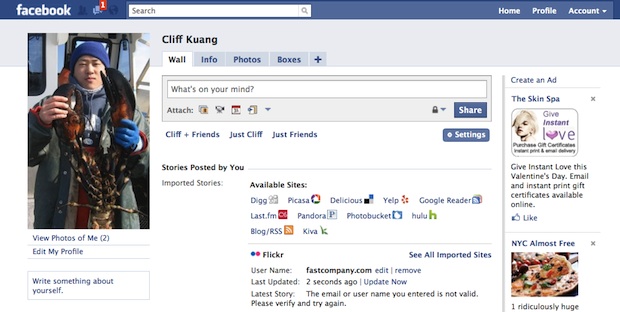
But really, how many people in your Facebook network link all those accounts to their wall? Facebook's integration is fiddly, forcing you to look up things like public URL's. I'm betting not many people in your network actually use that functionality, precisely because of the wonky integration process.
Moreover, even if you do start integrating accounts with Buzz of Facebook, the differences become huge. So far, Buzz is much simpler, much richer: You can integrate and curate entire photo albums from Flickr or even from a weblink since the service scrapes the article URL for images. Facebook only allows you a thumbnail. And for videos, Buzz actually lets you watch them directly in the pane, unlike Facebook, which sends you to a link out:
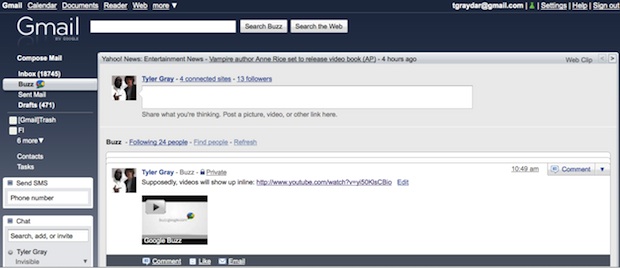
Those sound like minor details, but the mere fact that you can get so much media inside of Buzz means that it's much more believable as a central point from which you can track everything happening in your network. And that, really is what Buzz was after--it's trying to insert itself at the center of your content sharing life. Facebook didn't begin that way, and that genealogy shows itself pretty clearly when you start really testing its capabilities.
2. Interface: Facebook Wins
For a while now, designers have been complaining that Google's interfaces for Gmail, Reader, and all it's other services are getting no better--or perhaps even more complicated as more features are added. Google Buzz doesn't improve that situation, and might just further cement Google as a place where engineers stomp good design. (Sound familiar, Microsoft?)
Looking at the images above, you can see why: It's hard to know where to look with all that yawning whitespace, links undifferentiated by importance or usefulness, and extraneous information.
To be fair, Facebook isn't exactly beautiful. But what's most important is that it's intuitive. The proportions make sense, rather than sprawling throughout your window. It's easy to decide, at a glance, where you want to look and what's important to you. All that's hard to grasp in a screen cap, but compare the layout:
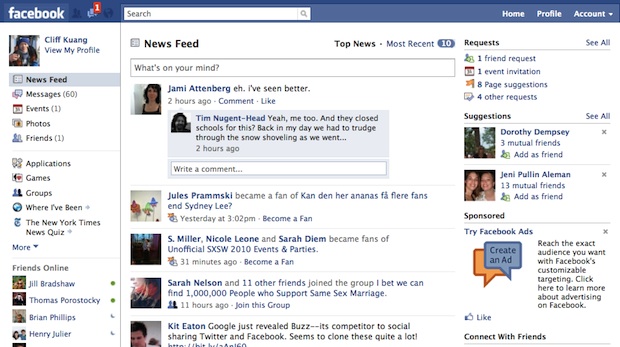
Notice how much information you see before having to scroll the window, and you get a sense of Buzz's short comings.
3. Fun Factor: Facebook Wins
Buzz works only insofar as the people you follow actually use the service, and the services its linked to. Facebook works for an entirely different reason: Because all your friends are on it, and all of them are looking to Facebook as an explicitly personal social outlet for sharing pictures and snooping on each others' lives.
Buzz doesn't have that advantage--and without personal profiles, what's Buzz except a really good Twitter client? Sure, it's great for sharing updates and images, but where do you actually want to share those? Through a dedicated, beefed up Twitter client like Buzz? Or through the network of friends you've already built up through Facebook--and which might not overlap too much with your e-mail address book?
In that sense, Facebook and Buzz aren't really in direct competition--that is, until Facebook unveils its mail service. When that happens, Buzz will certainly force Facebook to overhaul it's integration with Youtube, Twitter, and everything else (a new Facebook-AIM tie-up might be the tip of the iceberg).
Rich media capabilities versus the value of your social network: Let the battle begin.
source : http://www.fastcompany.com/1545960/google-buzz-facebook-social-media-networking-twitter